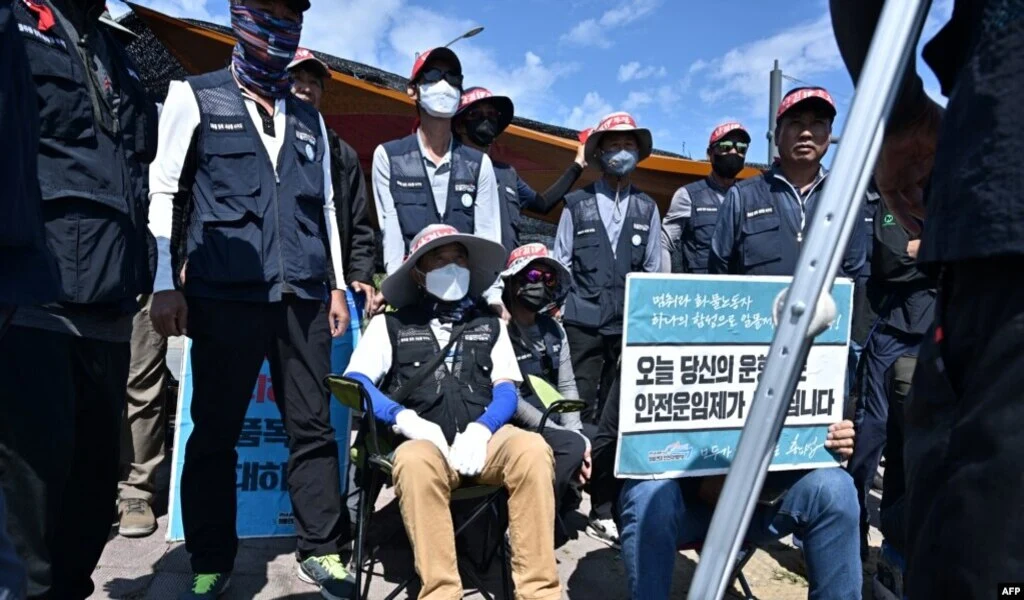(CTN NEWS) – SOUTH KOREA – On Thursday, union truckers in South Korea began their second significant strike in less than six months.
Threatening to disrupt production and fuel supplies for industries ranging from petrochemicals to automobiles in the 10th-largest economy in the world.
Truckers are urging the government to extend advantages to drivers in other industries, such as oil tankers, and to make the “Safe Freight Rate” minimum-pay scheme permanent.
Truckers in South Korea are planning to go on strike for a second time this year, threatening again to disrupt global supply chains for everything from automobiles to fuel https://t.co/kYggjGCR2L
— Bloomberg Markets (@markets) November 21, 2022
Which is set to expire at the end of the year due to rising fuel prices.
The government announced the three-year extension, but other union demands were denied.
The fourth-largest economy in Asia experienced cargo shipment delays throughout an eight-day period in June, which resulted in lost output and missed deliveries totalling more than $1.2 billion.
The strike’s main organizer, the Cargo Truckers Solidarity Union (CTSU), has warned that it could halt oil deliveries at significant refineries and transit at significant ports and industrial facilities.
On Thursday, the union’s chairman, Lee Bong-Ju, declared that “we have no choice except to stop all logistics in South Korea.”
The government has declined to broaden the Safe Freight Rate system because, according to Transport Minister Won Hee-ryong earlier this week, it has not been demonstrated to increase truckers’ safety but rather their pay.
According to Lee, “the government and the ruling party “misled and publicly defended capital, arguing that truckers’ income levels were not poor.

And if the ‘Safe Freight Rate’ system were expanded, prices could rise due to increasing logistics expenses.”
The union requests that the government ensure that large corporations are held responsible for minimum wage violations.
The June walkout prompted industry heavyweights like Hyundai Motor (005380. KS) and steelmaker POSCO (005490. KS) to reduce output.
And POSCO has warned that new action might stall repair work at a significant factory devastated by floods this summer.
“The cargo union strike will too severely impact the nation’s economy and people’s livelihoods if it continues,” Prime Minister Han Duck-soo warned Thursday.
On Thursday morning, the union began 16 protests across the nation, including one near a port in Ulsan that is home to a factory for Hyundai Motor.
A Reuters witness observed striking truckers eating cup noodles and drinking soju, a traditional rice-based Korean distilled alcohol.
The morning before the rally in the transportation hub of Uiwang, Gyeonggi Province, where union officials estimated that nearly a thousand truckers were gathered.
“We stop, the world will halt,” the trucks chanted. “Let’s stop driving to change the world!” is another.
At Busan, the largest port in South Korea, buses and police officers could be seen parked along major thoroughfares.
For urgent transport, the government is considering using military trucks, and it has also secured additional storage space in case commodities start to build up.
According to a previous statement made by an association representative, the South Korea Oil Station Association is requesting that gas station owners stock up on supplies before the strike.
Nearly all of CTSU’s 25,000 members, or roughly 6% of the nation’s truck drivers, are expected to participate in the strike, along with an undefined number of non-union members, according to the union.
The First South Korean Truckers’ Strike Llasted Three Days.
RELATED CTN NEWS:
At least 36 People have been Killed After a Factory Fire Broke Out in Central China
Anti-Virus Curbs In China Raise Global Economic Concerns
Earthquake Death Toll in Indonesia Jumps to 268







